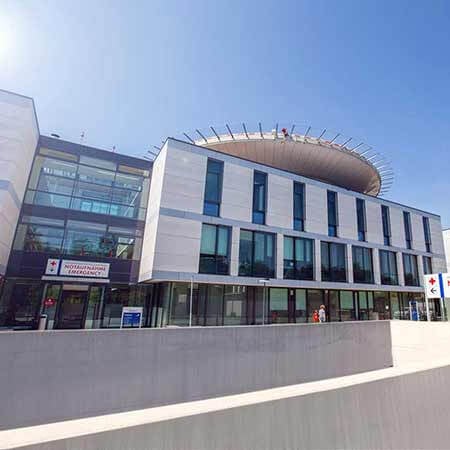Chronic myeloid leukemia is a type of blood cancer that begins in the bone marrow and develops as a result of the uncontrolled division of precursor cells of red blood cells, platelets, and most types of white blood cells. The transformation of a normal cell into a leukemia cell is initiated by a mutation in the BCR-ABL gene. In patients with chronic myeloid leukemia, a large number of defective cells that are unable to perform their functions enter the bloodstream. The disease mainly affects adults and is very rare in children. Chronic myeloid leukemia is not as aggressive as other blood cancers, such as acute lymphoblastic leukemia. Nonetheless, at the same time, it is a more challenging task to cure it completely, especially if it spreads to the brain. Therapy can be continued continuously for many years. You can go abroad to get rid of cancer forever or for a very long time. On the Booking Health website, you can find the cost of treatment and make your appointment at a specialized clinic.
Content
- Treatment principles
- Types of drug treatment
- Local treatment methods
- Stem cell transplant
- Where to undergo blood cancer treatment?
Treatment principles
Chronic myeloid leukemia occurs in three phases that follow each other. These are as follows:
- the chronic phase is characterized by the availability of up to 10% of blast cells in the blood;
- the acceleration phase involves a quick accumulation of blast cells in the body, and a patient has more than 10%, but less than 20% of blast cells detected in the blood;
- the blast crisis phase occurs when the blood contains 20% or more blast cells.
Chronic phase. Typically, patients with chronic myeloid leukemia in the chronic stage receive one of the tyrosine kinase inhibitors. If the treatment for such patients does not work or causes any side effects, doctors prescribe another drug.
Doctors perform PCR-based diagnostics for the BCR-ABL gene and check the bone marrow for the presence of the Philadelphia chromosome to improve treatment results. The follow-up examination is carried out for the first time 3 months after the start of therapy, and then again every six months. After 3 months of therapy, a complete hematological response should be achieved, as well as a partial cytogenetic response and a reduction in the number of BCR-ABL copies by at least 10 times. After 18 months, a complete response should be achieved in all three of the following parameters: hematological (blast cells), cytogenetic (bone marrow examination), and molecular (absence of BCR-ABL copies).
At least 70% of patients achieve a complete response after a year of treatment, and with the use of new drugs, the effectiveness is even higher. However, a complete response does not mean a cure for the disease, so therapy will be continued. If a complete response persists for 2-3 years, doctors can reduce the dosage of drugs and even stop their intake, but at the same time, a patient will be carefully monitored so that, in the event of a recurrence of the disease, treatment of chronic lymphoblastic leukemia can be continued. A brain imaging study can be also performed in order to exclude this type of complication. If the brain is involved, additional interventions are required.
For some people, primary treatment does not work. In such cases, doctors use measures to improve the effectiveness of treatment. For example, they:
- increase the dose of drugs;
- change the drug;
- use chemotherapy or interferon;
- perform stem cell transplantation (in young patients, if a suitable donor can be found).
Acceleration phase. The number of blast cells in the blood increases, which causes the manifestation of symptoms. Treatment is generally the same as in the chronic phase, but the response rate is lower. Doctors are more likely to use new drugs from the group of tyrosine kinase inhibitors. A combination of interferon drugs, chemotherapy, and targeted therapy can sometimes be used as well. In this phase, doctors often perform donor stem cell transplantation, although better results can be achieved if the disease is still transferred to the chronic phase before the transplantation. Sometimes healthcare professionals perform transplantation of the patient's own stem for this purpose. This treatment option does not cure cancer, but provides a remission of the disease.
Blast crisis phase. The course of this phase is the same as acute leukemia. There are more cells and they are more malignant. If cancer is first detected in this phase, then treatment will be immediately started with high doses of tyrosine kinase inhibitors and with new drugs from this group. Standard chemotherapy only works in 20% of patients, and the remission achieved is short-lived. Only donor stem cell transplantation helps to cure the disease at this stage. In the blast crisis phase, it is much less effective than in the chronic phase of blood cancer. Blasts spread throughout the body and can affect the brain. If such a complication is detected, additional interventions on the brain may be required. For instance, brain metastases can be destroyed with the help of laser ablation.
Types of drug treatment
Targeted therapy is considered the first choice. Chemotherapy and interferons are used less frequently.
Targeted therapy
The mainstay of treatment is tyrosine kinase inhibitors targeting the abnormal BCR-ABL gene. In Europe, 6 drugs have already been approved for the treatment of chronic myelogenous leukemia. As a rule, doctors use one drug only, and it must be taken for a long time. If one tyrosine kinase inhibitor is not effective, doctors prescribe another one. These drugs work best in the chronic phase, but they usually do not cure the disease permanently, so long-term therapy is required.
Immunotherapy
Immunotherapy involves the use of interferon preparations. This is an outdated method of treatment that is rarely used in developed countries. It can be used only in cases where targeted therapy no longer works. The effect of interferons is weaker and they cause more side effects. Besides, these drugs have to be injected every day.
Chemotherapy
Today, chemotherapy is used much less often than before, as targeted therapy is usually more effective. However, sometimes the need for the use of cytostatic chemotherapy arises. This can be prescribed in the following cases:
- the lack of effect from tyrosine kinase inhibitors;
- the transition of the disease to the acceleration phase;
- the necessity to quickly reduce the number of blast cells in the blood and reduce the size of the spleen;
- before stem cell transplantation.
Local treatment methods
Local methods of treatment include radiation therapy and surgery. The need for these methods of treatment is rare.
Radiation therapy can be used in the following cases:
- irradiation of the enlarged spleen, which puts pressure on the stomach and makes it difficult for food to pass;
- local irradiation of brain metastases (rare option);
- bone irradiation in the case of severe pain syndrome;
- treatment of the disease in the blast crisis phase, if chronic myeloid leukemia has transformed into acute lymphoblastic leukemia (but this rarely happens);
- preparation for stem cell transplantation (radiation therapy can rarely complement high-dose chemotherapy).
Surgery for myeloid leukemia does not play a role in curing the disease or achieving a remission. A surgical procedure can be performed exclusively for symptomatic purposes. Sometimes doctors have to do a splenectomy, a surgical procedure to remove the spleen. The organ can also be reduced with chemotherapy or radiation therapy, but these methods do not work as quickly. The operation contributes to the normalization of the passage of food through the stomach and the increase of the number of blood cells, since the spleen is responsible for their destruction. In developed countries, doctors perform a splenectomy using a minimally invasive laparoscopic technique through short abdominal incisions.
Stem cell transplant
If standard treatment does not work, myeloid leukemia in young patients can be treated with stem cell transplantation. Since the patient's own bone marrow is damaged, and the cells contained in it may cause cancer recurrence, donor stem cells are used for the transplant. These stem cells can be harvested from a sibling, provided that the antigens match. If there is no suitable donor among the relatives, a donor will be searched for in a multi-million donor database and an unrelated transplantation will be performed.
The treatment begins with high-dose chemotherapy. A patient receives higher doses of drugs than usual, as there is no need to save their own bone marrow. In the process of treatment, it is irreversibly damaged. At the same time, doctors usually manage to cure blood cancer, and the bone marrow is subsequently restored with a stem cell transplant. Stem cells are injected intravenously, and after a few weeks, the new bone marrow begins to produce blood cells. Patients spend this time in a sterile box, since they have virtually no immunity and any infection becomes deadly.
A stem cell transplant usually helps to cure blood cancer or at least achieve a complete response that lasts a long time. In some patients, a complete cancer remission is not achieved. In such cases, doctors try to boost the graft-versus-tumor immune response. It is possible only with a donor stem cell transplant. The renewed immunity is not as loyal to cancer as the patient's own and can attack malignant cells. The development of a full-fledged graft-versus-tumor response is hampered by immunosuppressants that the patient is taking after the transplantation. However, if there is no graft-versus-host disease, these drugs may be discontinued. The new bone marrow will then attack cancer more effectively. If the immune response is weak, doctors inject the patient with white blood cells obtained from a stem cell donor. They enhance the graft-versus-tumor response.
Where to undergo blood cancer treatment?
You can count on better results if you go to one of the hospitals in developed countries. Although the cost of treatment in Western Europe may be higher than in your native country, the higher prices for doctors' services are offset by the high treatment effectiveness. With a high probability, you will be able to completely get rid of cancer, or at least achieve a long-term remission of the disease.
There are a few reasons for you to undergo blood cancer treatment abroad:
- the use of the latest methods of treatment;
- more effective drugs are available abroad that are not yet used in countries with poorly developed medicine;
- most patients achieve a complete response to therapy;
- successful treatment in patients of any age, including the elderly;
- the use of stem cell transplantation, which helps to cope with even the most severe types of cancer.
You are welcome to use the Booking Health service to undergo your diagnostics and treatment for blood cancer abroad. On our website, you can find the cost of treatment in different hospitals, compare prices, and make your treatment appointment at the hospital at the best price. The cost of treatment for blood cancer will be lower for you due to the absence of additional fees for foreign patients. The specialists from the Booking Health company will help you to choose a hospital specializing in blood cancer treatment and organize your trip.
When making your treatment appointment at the hospital through the Booking Health service, you will receive insurance that will cover all unexpected medical expenses. This means that the initial cost of treatment will not increase for you. Even if additional procedures are required, the price of the medical care program will remain the same, since all extra expenses will be covered by your insurance.
Authors:
The article was edited by medical experts, board certified doctors Dr. Nadezhda Ivanisova and Dr. Sergey Pashchenko. For the treatment of the conditions referred to in the article, you must consult a doctor; the information in the article is not intended for self-medication!
Sources:
National Center for Biotechnology
Cancer Research Institute
European Society for Medical Oncology










